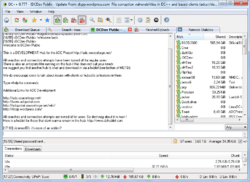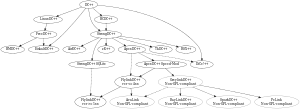DC++
DC++ is a free and open-source, peer-to-peer file-sharing client that can be used for connecting to the Direct Connect network or to the ADC protocol. It is developed primarily by Jacek Sieka, nicknamed arnetheduck.
 | |
 DC++ 0.777 running on a Windows 7 Installation | |
| Developer(s) | Jacek Sieka |
|---|---|
| Stable release | 0.868
/ November 12, 2018 |
| Written in | C++ |
| Operating system | Windows |
| Type | Peer-to-peer |
| License | GNU GPLv2 or later |
| Website | dcplusplus.sourceforge.net |
As of 2008, DC++ had around 90% market share of the Direct Connect community.[1]
DC++ is a free and open-source alternative to the original client, NeoModus Direct Connect (NMDC); it connects to the same file-sharing network and supports the same file-sharing protocol. One of the reasons commonly attributed to the aforementioned popularity of DC++ is that it has no adware of any kind, unlike NMDC.[2]
Many other clients exist for the Direct Connect network, and most of these are DC++ "mods": modified versions of DC++, based on DC++'s source code. A partial list of DC++ mods is given below. Some of these clients were developed for specialized communities (e.g. music-sharing communities), or in order to support specific experimental features, or perhaps features that have been rejected from inclusion in DC++ itself. An example of an experimental feature is hashing, which was initially implemented in BCDC++ and later adopted by DC++.
Forks
An advantage of the free and open-source nature of DC++ is that several mods have been released which add features to the original client.
Many users send patches to DC++ which are included in future releases, but some features are rejected by the developer. Stated reasons for rejecting a patch are because they are coded poorly, or that the feature is frivolous, abusable or overly specialized, and does not belong in the main client. Examples include: upload bandwidth limiting (many users feel that upload bandwidth limiting is a form of cheating, while other users not using a full-duplex network connection can only achieve reasonable download speeds by limiting uploads), colorized chat, specialized operator functions (e.g. client/share checking).
The developers of some forks contribute features and bug-fixes back upstream to DC++.
Client software comparison
General
| Client | FOSS |
Software license | Active | Release date (latest version) |
|---|---|---|---|---|
| AirDC++ | Yes | GNU GPLv2 or later | Yes | 2019-11-17 (v3.60) |
| ApexDC++ | Yes | GNU GPLv2 or later | Yes | 2018-12-25 (v1.6.5) |
| DC++ | Yes | GNU GPLv2 or later | Yes | 2018-11-12 (v0.868) |
| EiskaltDC++ | Yes | GNU GPLv3 or later | Yes | 2013-08-29 (v2.2.9) |
| FlylinkDC++ | Yes | GNU GPLv2 or later | Yes | 2017-01-20 (r504) |
| LinuxDC++ | Yes | GNU GPLv2 or later | No | 2011-04-17 (v1.1.0) |
| RSX++ | Yes | GNU GPLv2 or later | No | 2011-04-14 (v1.21) |
| StrongDC++ | Yes | GNU GPLv2 or later | No | 2010-12-27 (v2.42) |
| TkDC++ | Yes | GNU GPLv2 or later | No | 2010-11-29 (v1.3) |
| Client | FOSS |
Software license | Active | Release date (latest version) |
Operating system support
| Client | Windows |
Linux |
macOS |
BSD |
Haiku |
|---|---|---|---|---|---|
| AirDC++ | Yes | Yes | Yes | No | No |
| ApexDC++ | Yes | No | No | No | No |
| DC++ | Yes | No | No | No | No |
| EiskaltDC++ | Yes | Yes | Yes | Yes | Yes |
| FlylinkDC++ | Yes | No | No | No | No |
| LinuxDC++ | No | Yes | No | Yes | No |
| RSX++ | Yes | No | No | No | No |
| StrongDC++ | Yes | No | No | No | No |
| TkDC++ | Yes | No | No | No | No |
| Client | Windows |
Linux |
macOS |
BSD |
Haiku |
Interface and programming
| Client | GUI |
CLI |
WebUI |
Programming language |
Based on |
|---|---|---|---|---|---|
| AirDC++ | Yes | No | Yes | C++ | StrongDC++ |
| ApexDC++ | Yes | No | No | C++ | StrongDC++ |
| DC++ | Yes | No | No | C++ | - |
| EiskaltDC++ | Yes | Yes | Yes | C++ | DC++ |
| FlylinkDC++ | Yes | No | Yes | C++ | ApexDC++/StrongDC++ |
| LinuxDC++ | Yes | No | No | C++ | DC++ |
| RSX++ | Yes | No | No | C++ | StrongDC++ |
| StrongDC++ | Yes | No | No | C++ | DC++ |
| TkDC++ | Yes | No | No | C++ | StrongDC++ / DC++ bzr |
| Client | GUI |
CLI |
WebUI |
Programming language |
Based on |
Features
| Client |
Magnet URI |
UPnP |
NAT traversal |
DHT |
Encryption |
IPv6 |
IDNA |
Plugin |
Proxy |
Hash algorithms | Protocol support |
|---|---|---|---|---|---|---|---|---|---|---|---|
| AirDC++ | Yes | Yes | Yes | No | Yes | Yes | No | Yes | Tiger Tree Hash | TIGR, ADCS | |
| ApexDC++ | Yes | Yes | Yes | Yes | Yes | No | No | Lua, C++ | Yes | Tiger Tree Hash | TIGR, ADCS |
| DC++ | Yes | Yes | Yes | No | Yes | Yes | No | Yes | Tiger Tree Hash | TIGR, ADCS | |
| EiskaltDC++ | Yes | Yes | Yes | Yes | Yes | No | Yes | Lua, Qt Script, QML | Yes | Tiger Tree Hash | TIGR, ADCS |
| FlylinkDC++ | Yes | Yes | Yes | Yes | Yes | No | Yes | Yes | Tiger Tree Hash | TIGR, ADCS | |
| LinuxDC++ | Yes | Yes | Yes | No | Yes | No | No | Yes | Tiger Tree Hash | TIGR, ADCS | |
| RSX++ | Yes | Yes | Yes | Yes | Yes | No | No | Lua, C++ | Yes | Tiger Tree Hash | TIGR, ADCS |
| StrongDC++ | Yes | Yes | Yes | Yes | Yes | No | No | Yes | Tiger Tree Hash | TIGR, ADCS | |
| Client |
Magnet URI |
UPnP |
NAT traversal |
DHT |
Encryption |
IPv6 |
IDNA |
Plugin |
Proxy |
Hash algorithms | Protocol support |
See also
- NeoModus Direct Connect protocol (NMDC)
- Advanced Direct Connect (ADC)
References
- Fredrik Ullner (January 2008). "PC Pitstop and its P2P-report". DC++: Just These Guys, Ya Know?. Retrieved 2008-03-19.
- Annalee Newitz (July 2001). "Sharing the Data". Metro, Silicon Valley's Weekly Newspaper. Metro Publishing Inc. Retrieved 2006-12-21.
- "Archived copy". Archived from the original on 2011-07-07. Retrieved 2011-01-28.CS1 maint: archived copy as title (link)
External links
| Wikimedia Commons has media related to DC++. |
Official
- DC++ (Official Website)
- DC++ Webhelp
